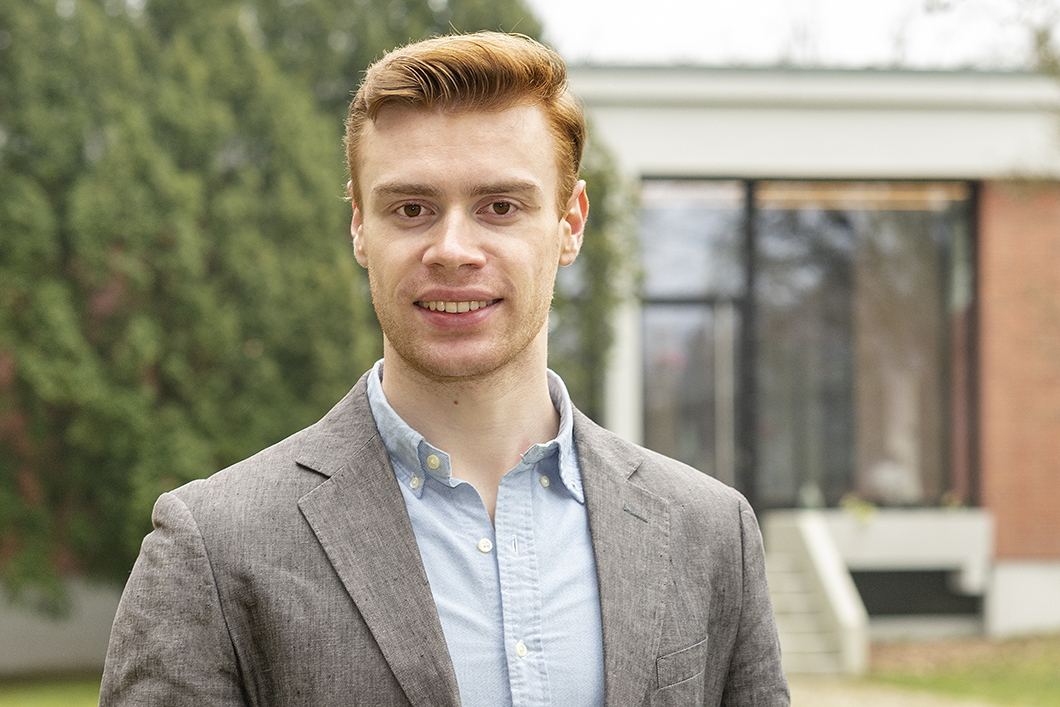
Fabian Simon, Inorganic Trace Analysis Division
Source: BAM
Interview series "Introducing People@BAM"
Fabian Simon, Inorganic Trace Analysis Division
Fabian, tell us a little bit about yourself. Why did you choose to pursue a PhD at BAM?
I completed my BSc in ecotrophology at CAU Kiel. During this time, I worked in a routine analytical laboratory specialized on food and feed analysis. Here, my work was focused on sample preparation for pesticide analysis and microbiological testing. Not being in contact with chemistry before this experience strongly raised my interest in analytical chemistry. To pursue my interest in science I moved to Potsdam to study nutrition science for my MSc. At Potsdam University courses focused on biochemistry. Nonetheless, I developed more and more interest in the analytical field and selected my courses accordingly. At the end of my master’s degree, I went for an internship to BAM’s Inorganic Trace Analysis division and started to work on the topic of fluorine analysis. I quickly became enthusiastic about this topic, and now I am very glad to have the opportunity to do my PhD in this field and at BAM.
Do you have any role models and, if so, which ones?
During my time in Kiel while working in the routine analytical laboratory I was supported by my laboratory manager. Somehow, he saw potential in me that I hadn't discovered myself at the time. In addition, he gave me some tricky chemistry related homework. This helped quite a lot to compensate for my missing background knowledge at the time. When I switched to Potsdam University, I did not only learn new analytical techniques, but I was also introduced to a new point of view: Science is not only mysterious but can be fun as well. So, my role models are the people I worked with until now that supported me, taught me how science works and introduced me to the fascinating side of science.
What does your research focus on, and what excites you most about this topic?
My research focuses on per- and polyfluoroalkyl substances (PFASs), a group of chemicals which gets a lot of attention because of their persistent, bioaccumulative and toxic properties - thus, PFAS are so called “emerging contaminants”. Since the PFASs group includes several thousands of individual substances target analytical methods fail to give a holistic picture of the pollution situation. Appropriate PFAS sum parameter methods are strongly needed to indicate a “realistic” level of pollution. Therefore, my PhD topic focuses on the development of PFAS sum parameter methods. The high number of compounds in this group (all with different physical/chemical properties) makes it challenging to summarize them into one parameter. Additionally, fluorine is one of the hardest to analyze elements (because of its high ionization potential/electronegativity) in elemental analytics. To analyze PFAS sum parameters we use a special technique called high resolution-continuum source-graphite furnace molecular absorption spectrometry (HR-CS-GFMAS) – analytical chemists like long and complicated abbreviations very much. HR-CS-GFMAS is an interesting technique because several mechanisms of action are not yet understood, giving the technique an alchemistic character. Therefore, for me, coming from a different field, it might be sometimes advantageous to think in different ways to solve problems. Overall, I like challenges and solving problems. Therefore, the topic matches me very well.
What do you like most about your PhD experience and how is BAM unique to other institutes?
The most enjoyable times for me are during the start of a new research project. I like trying out new things on a trial-and-error-basis. Implementing my own ideas into my research is very satisfying. Another experience I enjoy during my PhD at BAM is having the opportunity to work with master students and guide them through their thesis. This also gave me one or the other opportunity to think outside the box of my own topic. Here, BAM offers countless opportunities for further education. Additionally, as a PhD student at BAM you are part of a PhD student community in the division, department, and the whole BAM. Here, I like the idea of sharing expertise and experiences with each other. Outside of the PhD experience, BAM offers not only the expertise of long-term employees but also almost every known to man equipment possible. Additionally, BAM has a very good reputation which makes working with different people also internationally very easy and enjoyable.
What do you like to do when you’re not doing research?
In my free time I like to do sports (running, fitness, football) or music (piano). For me, that is essential for keeping a healthy balance besides the PhD life. Recently, influenced by my work at BAM I got into video and photo editing. As a result, together with my colleges we filmed and edited a labwalk video through our division for the Berlin Science Week 2021.
If you should describe your job at BAM in one sentence – what would that be?
Theory is always wrong, but I know what I’ve done; experiment is always right, but I do not know what I have measured.


